 Petzlover
Petzlover Bandog is originated from United Kingdom but Schillerstovare is originated from Sweden. Bandog may grow 15 cm / 6 inches higher than Schillerstovare. Bandog may weigh 32 kg / 71 pounds more than Schillerstovare. Bandog may live 3 years less than Schillerstovare. Both Bandog and Schillerstovare has almost same litter size. Bandog requires Moderate Maintenance. But Schillerstovare requires Low Maintenance
Bandog is originated from United Kingdom but Schillerstovare is originated from Sweden. Bandog may grow 15 cm / 6 inches higher than Schillerstovare. Bandog may weigh 32 kg / 71 pounds more than Schillerstovare. Bandog may live 3 years less than Schillerstovare. Both Bandog and Schillerstovare has almost same litter size. Bandog requires Moderate Maintenance. But Schillerstovare requires Low Maintenance
 The original Bandogs were bred for guarding and protecting. It is believed that the dogs were developed from eastern shepherds, the American Pit Bull Terrier and Mastiffs and crossed with western Bullenbeissers and hounds, and it is thought that the hybrid breed came into existence way back, around 1250-1300 in Middle England.
The original Bandogs were bred for guarding and protecting. It is believed that the dogs were developed from eastern shepherds, the American Pit Bull Terrier and Mastiffs and crossed with western Bullenbeissers and hounds, and it is thought that the hybrid breed came into existence way back, around 1250-1300 in Middle England.
Although it isn’t possible to say exactly how the Bandog originated, it is certain that the dogs were bred with a functional purpose – to guard and protect. In fact in the late 1960s a veterinarian by the name of Swinford started a breeding program, even though breeders of Bandogges disagree on the breeds that went into Swinford's original breeding scheme. It is believed to have been 50% American Pit Bull Terrier and 50% molosser.
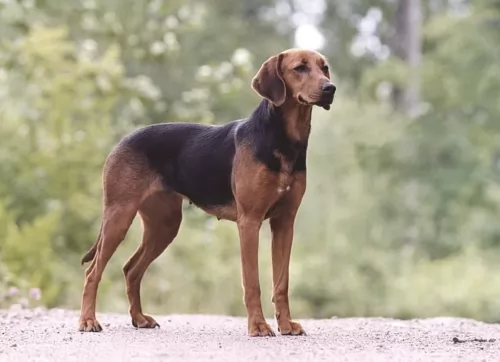 The Schillerstövare originated in Sweden, being named after a Swedish farmer, Per Schiller. After he died, the dog was named Schillerstövare in 1907, and was Sweden's first native dog breed.
The Schillerstövare originated in Sweden, being named after a Swedish farmer, Per Schiller. After he died, the dog was named Schillerstövare in 1907, and was Sweden's first native dog breed.
The Swedish Kennel Club recognised this dog in 1907 and it is also recognised by the Federation Cynologique Internationale as well as a number of minor kennels and dog clubs.
The dog has always been used as a hunting dog and the English Foxhound is the e foundation for this breed.
 The Bandog is a powerful, stocky, muscular dog with small, upright ears. His tail is long and tapered, but most people prefer to have the tail docked. With his broad skull, wide shoulders and powerful chest, he is also confident and intelligent. He is a rugged dog, heavily boned and muscled, and quite aggressive when provoked. This characteristic comes from the intentional breeding to combine the courage and tenacity of an American Pit Bull Terrier with the size of the Bull Mastiff and its guarding instincts.
The Bandog is a powerful, stocky, muscular dog with small, upright ears. His tail is long and tapered, but most people prefer to have the tail docked. With his broad skull, wide shoulders and powerful chest, he is also confident and intelligent. He is a rugged dog, heavily boned and muscled, and quite aggressive when provoked. This characteristic comes from the intentional breeding to combine the courage and tenacity of an American Pit Bull Terrier with the size of the Bull Mastiff and its guarding instincts.
Even though the breed has a history of competitive fighting, today when he is trained and socialized he can be a devoted, controlled and amicable family pet, even getting on well with children and being social and affectionate with his human family members. They can be aggressive with strangers, more so if provoked or threatened by them.
Bandogges are able to get along with other animals in the home if they are raised with them, but can be aggressive with pets they aren’t familiar with. You won’t find a better guard dog and with his low barking tendencies, he quietly watches, waiting to go for any intruders.
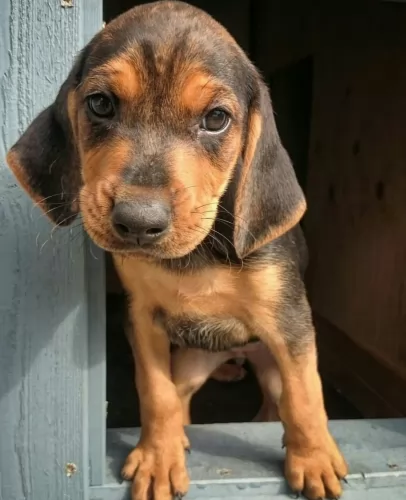 The Schillerstövare is a medium to large sized dog. They’re athletic and muscular.
The Schillerstövare is a medium to large sized dog. They’re athletic and muscular.
Standing at between 53–61cm in height and weighing in the region of 18–25kg, the coat of the dog is fairly short and harsh, with the color being black and tan.Sometimes you’ll see some white markings on the chest and paws.
The head is domed, the eyes brown, bright and alert and the ears of the dog are broad, medium length and floppy. The long tail is carried low or held out when running or alert.
If you allow your Schillerstovare to have puppies, you can expect between 3 to 7.
The Schillerstovare is a calm dog but he can get petty lively when there’s a game to be had. He gets on well with well disciplined children who have been taught to be kind and respectful to animals. He also gets on well with pets in the home. Just like with most other dogs, he will need to be trained and socialized as he is a strong willed, confident, dominant dog.
He is friendly and active but will be somewhat reserved around strangers.These dogs will require a lot of exercise and will need quite a bit of space too. They aren't well suited to small properties in the city. He will need a daily walk but also a chance to get off his leash and run free in the park. Other forms of exercise such as hikes, ball game and swimming will delight him.
 This is certainly an intimidating looking breed, having been developed from a variety of stock breeds, Because of this, there isn’t a standard set for the dog and his appearance can vary. He isn’t recommended for first-time dog owners, because he is quite complex – being both docile and aggressive – not your regular dog. He will certainly require an owner who shows them who is boss.
This is certainly an intimidating looking breed, having been developed from a variety of stock breeds, Because of this, there isn’t a standard set for the dog and his appearance can vary. He isn’t recommended for first-time dog owners, because he is quite complex – being both docile and aggressive – not your regular dog. He will certainly require an owner who shows them who is boss.
The Bandog may well have a reputation of being a fighter, but once he has had training and socialization, he turns out to be just a gentle giant. With a strong, firm owner, he is good with children too and becomes a devoted guardian to the entire family.
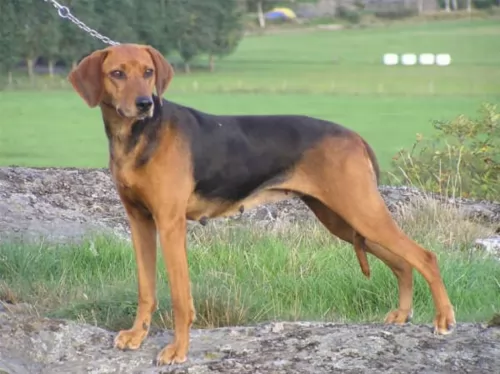 Schillerstovares are social, loving, friendly, loyal dogs who enjoy being around their human family. He’s going to need a lot of exercise, both mental and physical to keep him from boredom and frustration.
Schillerstovares are social, loving, friendly, loyal dogs who enjoy being around their human family. He’s going to need a lot of exercise, both mental and physical to keep him from boredom and frustration.
He will rely on you for at least a daily walk. He is strong-will and confident and will do well in a family where they are active and where they are firm, patient, kind and consistent in their behaviour towards him because then he ticks all th right boxes for being a splendid pet.
 Your Bandog is generally a robust, healthy breed, but he may well be prone to health concerns. Some of these are hip and elbow dysplasia and Bloat
Your Bandog is generally a robust, healthy breed, but he may well be prone to health concerns. Some of these are hip and elbow dysplasia and Bloat
This is an abnormal formation of the hip socket that can, if left unattended, lead to lameness and painful arthritis of the joints. eye problems.
His size and his deep chest also mean he is prone to bloat. Known as gastric dilatation and volvulus, this isn’t good for your dog as the stomach becomes distended with gas, putting pressure on the diaphragm, which can cause breathing problems.
Just because your Bandog is a healthy breed, it doesn’t mean your puppy is immune from his puppy shots. Your puppy will need his first vaccinations from 6 to 8 weeks of age for parvovirus, distemper, rabies and hepatitis.
Check your country’s vaccination regulations, because in the United States, most states require that all dogs be vaccinated against rabies.
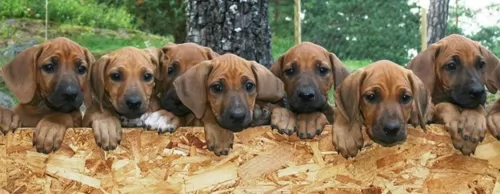 Even though your Schillerstovare is a healthy dog breed, hip dysplasia is a common dog disease that many dogs get.
Even though your Schillerstovare is a healthy dog breed, hip dysplasia is a common dog disease that many dogs get.
This is a skeletal disease when a dog’s hip joints become partially dislocated. It can be very difficult for your dog to get around, and he can also develop arthritis. It gets very sad when your dog doesn’t even want to participate in games anymore.
 These large, short-haired dogs have a short coat and they are easy to groom. Remove loose hair with a rubber brush twice a week. The breed is an average shedder and if you start regular brushing from when he is a young dog, he will be happy to let you do it as an adult. Check his ears and eyes regularly and clip his toe nails.
These large, short-haired dogs have a short coat and they are easy to groom. Remove loose hair with a rubber brush twice a week. The breed is an average shedder and if you start regular brushing from when he is a young dog, he will be happy to let you do it as an adult. Check his ears and eyes regularly and clip his toe nails.
The Bandog is an energetic breed that will require a good deal of exercise. This is one breed you can’t leave alone in your garden day after day. He will require games and walks to avoid boredom and frustration.
The Bandog puppy will grow and develop quickly, so his diet should be good quality dog food. He is big and thirsty and there must be a ready source of clean drinking water. Because he is inclined to drool, his water bowl will need to be cleaned out regularly to avoid him drinking contaminated water.
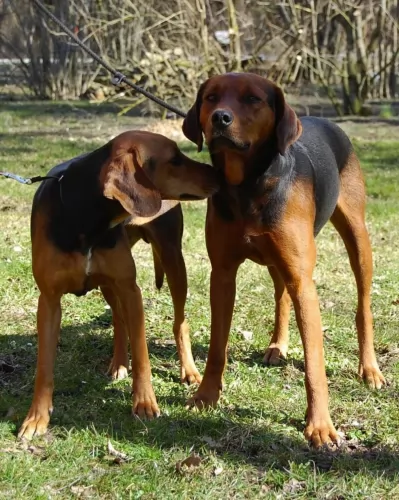 With his short coat, the Schillerstovare is considered a low maintenance dog and requires a minimal amount of grooming. Brushing should be done twice a week to remove loose hair. The harsh outer coat seems to repel dirt and dust.
With his short coat, the Schillerstovare is considered a low maintenance dog and requires a minimal amount of grooming. Brushing should be done twice a week to remove loose hair. The harsh outer coat seems to repel dirt and dust.
Trim your pet’s nails, check inside his ears for signs of redness, make sure his eyes are bright and clear and make sure he doesn’t have any unusual lumps on him.
Make sure his vaccines are up to date to avoid deadly canine diseases. Take him to the vet when you suspect he isn’t his normal self.
Dogs, just like humans, do well on good, nutritious diets. Feed a human lots of junk food and sweets and they’ll grow up to be obese and unhealthy. That's exactly how it is with dogs too. Some of the best commercially manufactured dog foods are convenient and they can be good if you look at the top brands. Look for ones that cater for your dog’s age, size, breed and activity levels. This dry kibble can be made more inviting for your pet when you include some homemade food.
Dogs just want simplicity so that they don’t battle with digestive problems. Boiled chicken, sweet potatoes, brown rice or pasta, carrots and spinach will be wonderful for him when you chop the food up and add it into the dry kibble twice a week. See his tail wag and his brown eyes light up when he smells this treat. Some raw meat added up occasionally will also contribute to your pet’s heath.
Make sure he is never without a constant supply of fresh, cool water.